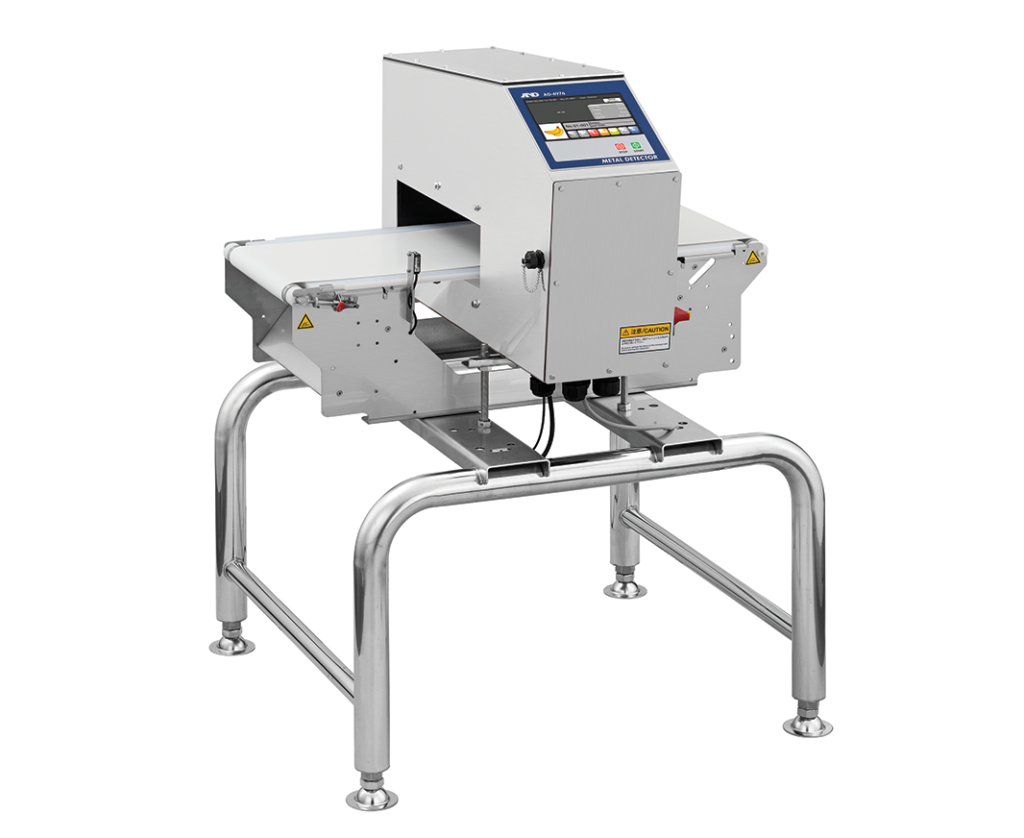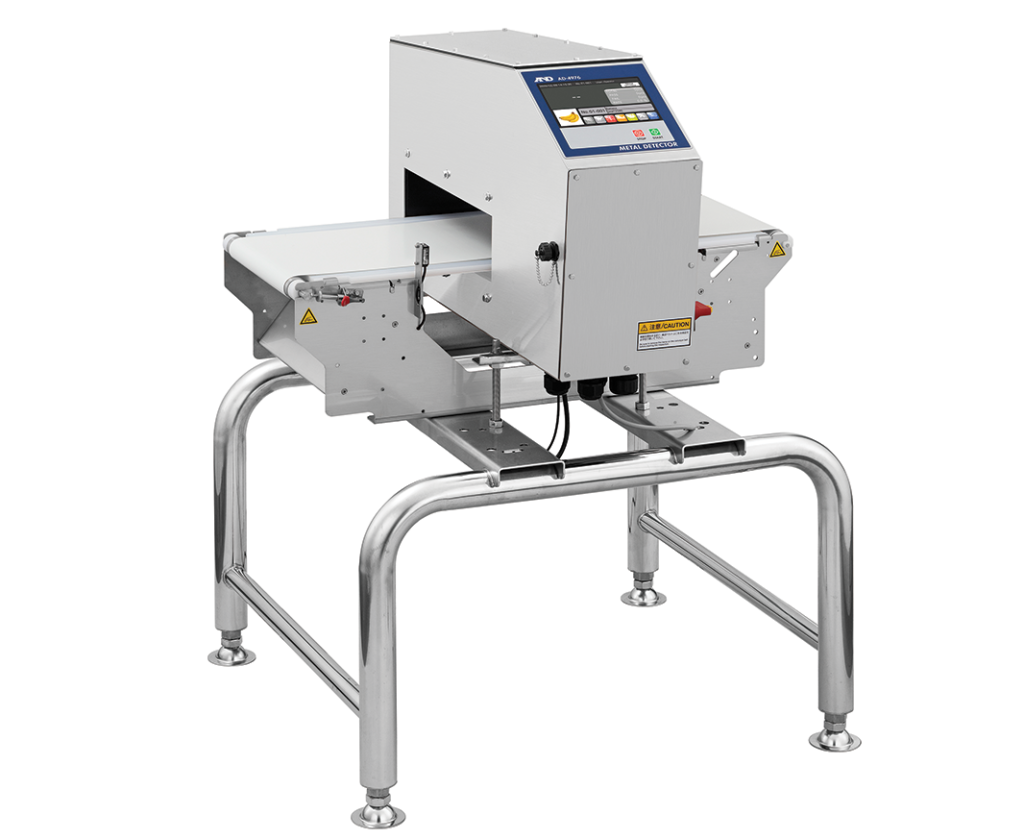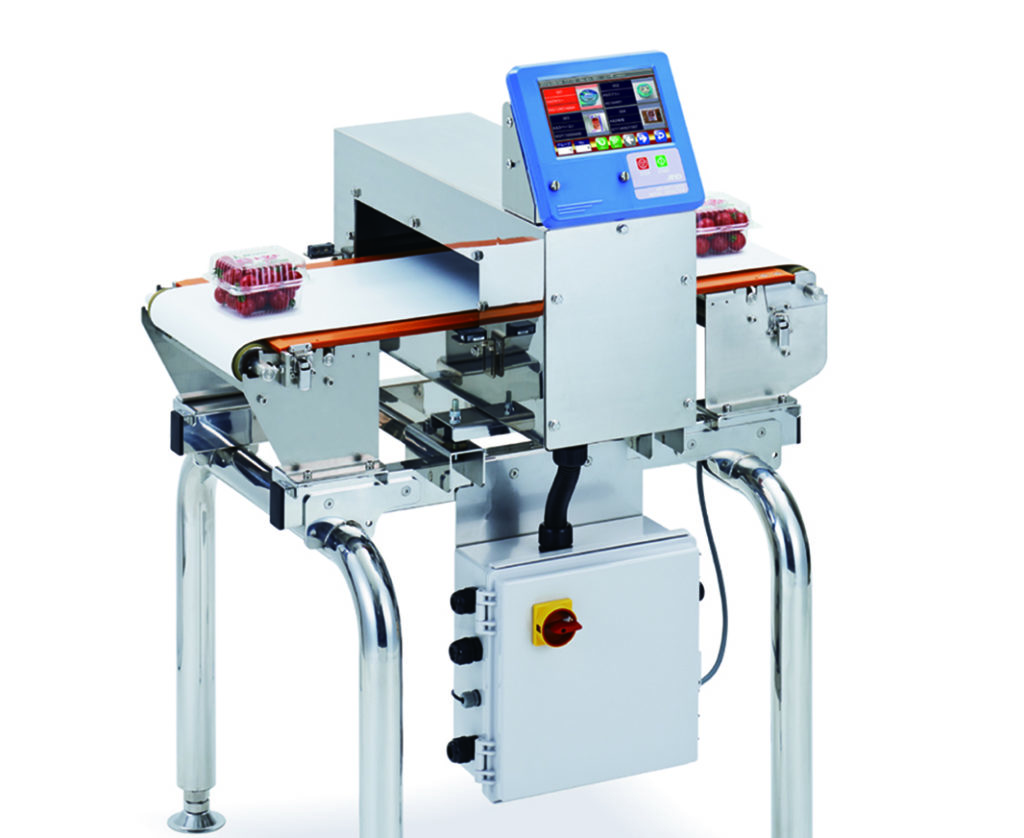 Metal Detector AD-4976 450/250 aperture
Metal Detector AD-4976 450/250 aperture
This industrial food grade metal detector is suitable for packages that do not exceed 230mm in overall height.
Aperture Size: 450 mm (W) x 250 mm (H)
 Metal Detector AD-4976 450/170 aperture
Metal Detector AD-4976 450/170 aperture
This industrial food grade metal detector is suitable for packages that do not exceed 150mm in overall height.
Aperture Size: 450 mm (W) x 170 mm (H)
 Metal Detector AD-4976 350/250 aperture
Metal Detector AD-4976 350/250 aperture
This industrial food grade metal detector is suitable for packages that do not exceed 230mm in overall height.
Aperture Size: 350 mm (W) x 250 mm (H)
 Metal Detector AD-4976 350/170 aperture
Metal Detector AD-4976 350/170 aperture
This industrial food grade metal detector is suitable for packages that do not exceed 150mm in overall height.
Aperture Size: 350 mm (W) x 170 mm (H)
 Metal Detector AD-4976 350/100 aperture
Metal Detector AD-4976 350/100 aperture
This industrial food grade metal detector is suitable for packages that do not exceed 80mm in overall height.
Aperture Size: 350 mm (W) x 100 mm (H)
 Metal Detector 450/250 aperture
Metal Detector 450/250 aperture
Our AD-4971 Series Metal Detectors are all IP65 rated (dust and water resistant, IP69K optional), which makes them ideal for the food and beverage industry as well as nutraceutical and pharmaceutical markets.
Aperture Size: 450 mm (W) x 250 mm (H).
 Metal Detector 450/170 aperture
Metal Detector 450/170 aperture
Our AD-4971 Series Metal Detectors are all IP65 rated (dust and water resistant, IP69K optional), which makes them ideal for the food and beverage industry as well as nutraceutical and pharmaceutical markets. Aperture Size: 450 mm (W) x 170 mm (H).
 Metal Detector 350/250 aperture
Metal Detector 350/250 aperture
Our AD-4971 Series Metal Detectors are all IP65 rated (dust and water resistant, IP69K optional), which makes them ideal for the food and beverage industry as well as nutraceutical and pharmaceutical markets. Aperture Size: 350 mm (W) x 250 mm (H)
 Metal Detector 350/170 aperture
Metal Detector 350/170 aperture
Our AD-4971 Series Metal Detectors are all IP65 rated (dust and water resistant, IP69K optional), which makes them ideal for the food and beverage industry as well as nutraceutical and pharmaceutical markets. Aperture Size: 350 mm (W) x 170 mm (H).
 Metal Detector 350/100 aperture
Metal Detector 350/100 aperture
The most compact, food grade metal detector, this system is suitable for packages that do not exceed 80mm in overall height.
Aperture Size: 350 mm (W) x 100 mm (H) | 13.7” x 3.9”
Reasons for Purchasing a Metal Detector for food Industry:
Quality control and reporting demands on the grower and manufacturer are becoming more stringent, making it important to have proven and accurate solutions when it comes to ensuring proper food safety and inspection.
Metal is one of the most commonly found contaminants in the food production industry, and can be introduced at all stages of metal detection in food processing, as it may come from the machinery, utensils or other equipment.
Accurate food metal detection helps to ensure that these metal contaminants do not enter goods during the food processing or packaging process. Not only will this help you protect your customers from potential harm, it also gives your brand improved credibility. Other benefits of having a good metal detector include: reduced costs and order rejects, compliance with food safety standards, increase in productivity and efficiency, and ability to meet retailer demands.
Our range of industrial grade in-line metal detection systems & food inspection systems are suitable for various applications. Most of our metal detectors are IP65 / IP66 / IP69K rated, which makes them ideal for the food and beverage industry as well as nutraceutical and pharmaceutical markets. They are also easy to maintain and sanitise, with the entire system washable.
A&D’s industrial conveyor metal detectors come with a user-friendly interface, and can provide data capture to facilitate your QA reporting. Other features include automatic sensitivity setting function, inspection history function, and detachable conveyor belt.
To find out more about our inline metal detectors, or if you have any enquiries about metal detection service, food metal detector validation or metal detector calibration, please contact our team directly.
Food Grade Metal Detectors
Food grade metal detectors are an essential component of the quality control process that dictates the food industry. Metal detection is used to identify and remove metal contaminants from food products during production and packaging and is a vital step in preventing contaminants with metal fragments from reaching consumers and endangering the public. These metal detectors work by generating a magnetic field and analysing the signals produced when metal is detected. If any metal is found, the system triggers an alarm or activates a rejection mechanism to remove the contaminated item. Food grade metal detectors are essential for manufacturing compliance with food safety regulations, and to maintain consumer trust.
Types of Food Metal Detectors
In line Metal Detectors
One of the more common models of food grade metal detection is the in-line system; this model is renowned for its adaptability to seamlessly integrate into various food production lines. Its versatility stems from the diverse range of sizes, belt configurations, and sensors it offers. This system can automatically expel detected contaminants through a selection of rejection modules, such as air blasts, flipper arms, push and drop rejectors to name a few.
Pipeline/Pumped Detectors
These detectors are designed for integration into pipelines and systems where food products are transported in a liquid or semi-liquid form. They ensure metal contamination detection in flowing product streams.
Free-Fall/Gravity Detectors
This type of detection can be used for loose powder, granule or bulk food products, allowing items to pass through a detection area in free-fall. They’re commonly found in applications like bulk grains or powders.
Applications of Food Grade Metal Detectors
Food grade metal detectors serve a critical role in ensuring food safety and quality in various industry applications, including (but not limited to) food processing plants, confectionery industries, dairy industries, and even the pharmaceutical industry. Across the board, metal detection is a vital and indispensable method of identifying metal contaminants for removal before they can reach the public.
Why Choose A&D?
A&D Weighing is a proud company that takes great pride in supplying quality scales to a wide array of industries. We carry an extensive inventory that includes a wide range dynamic weighing systems and weight capture software. Besides metal detectors for food processing, we also stock weighing scales, food scales, checkweighers, and more. Whatever you need, A&D has you covered – feel free to browse the A&D website, and if you can’t find what you’re looking for, all you have to do is hit us up via the A&D Contact page, and one of our friendly staff members will be able to help you out.
Food Metal Detector FAQs
Where should I put a metal detector?
Metal detectors should be strategically placed in critical points along the food production and packaging process. The particular location ultimately depends on the specifics of your operation, both in terms of the layout as well as the manufacturing regulations and other specificities of the industry you work within. The most common location in many production lines is the end of line finished goods inspection area (to check for quality control before distribution).
What can’t be detected by a food metal detector?
Food metal detectors are primarily designed to identify metal contaminants, including ferrous (iron), non-ferrous (copper, aluminium), and stainless-steel materials. However, they are generally less effective at detecting non-metallic contaminants such as plastic, glass, or stone. For identifying these types of foreign objects, X-ray inspection systems are indeed better suited because they can detect a broader range of materials, including metals and non-metals, based on differences in density and composition.
How can you choose the right food metal detector?
While selecting your food metal detector, it’s important to evaluate the following factors:
Tasks Compatibility: One of the most important things to consider is whether or not the metal detector’s compatibilities are suited to your specific product. All products have different sensitivities depending on the product’s ingredients and size. Other factors such as whether the product is wet or dry can also affect your product’s conductivity readings.
Wherever possible, it is vital that you run some tests on the proposed metal detector prior to purchase to know what detection levels can be reached with your specific product.
Environmental Conditions: It’s important to keep your factory/store location in mind before you buy your metal detector. Hot and cold environments as well as humidity can affect the sensitivity readings.
Regulatory Compliance: Select a metal detector that meets Australian industry and safety standards.
Various Apertures: Food metal detectors can be constructed with different aperture sizes to accommodate various types of products and packaging while maintaining satisfactory sensitivity to metal contaminants. The choice of aperture size is an important factor and should be tailored to the characteristics of your specific product and the potential metal contaminants to ensure reliable detection while minimising false alarms and product waste.
Food products that are larger or irregularly shaped may require larger apertures to allow them to pass through without causing jams or blockages. Larger apertures are commonly used for bulk large products. Smaller apertures are suitable for products that are small, uniform, and tightly packaged, such as punnets, individually wrapped trays, tablets, or small containers. Smaller apertures generally provide higher sensitivity because they reduce the space available for contaminants to pass through undetected.
Depending on your specific product line requirements, you may require a food metal detector with a smaller aperture, one with a bigger aperture, or something in between. A&D stock a wide range of food metal detectors with a range of aperture sizes; this includes the Metal Detector with 350/170 aperture, the Metal Detector with 350/250 aperture, the Metal Detector with 450/170 aperture, and the Metal Detector with 450/250 aperture.
If you need help deciding which metal detector is suitable for your specific requirements, don’t hesitate to contact A&D directly, and we’ll be more than happy to help!
Q1: What is a food metal detector and what role does play?
A food metal detector is a device that detects and identifies the presence of foreign metallic objects in food. At A&D Inspection, these detectors are integral to our quality control process, ensuring that the food products we inspect are free from potentially harmful metal contaminants.
Q2: How sensitive is the A&D Inspection’s food metal detector?
A&D Inspection’s food metal detectors are highly sensitive and capable of detecting both ferrous and non-ferrous metals. The exact sensitivity depends on the product being examined and the type of metal but rest assured, our detectors are designed to catch even the smallest contaminants.
Q3: Can Food Metal Detectors identify all types of metal contaminants?
Yes, our food metal detectors are designed to identify all types of metal contaminants, including ferrous, non-ferrous, and stainless steel.
Q4: How does A&D ensure the reliability of their food metal detectors?
A&D Inspection conducts routine tests and regular maintenance to ensure our food metal detectors are always performing at their best. Additionally, our detectors are designed with the latest technology to ensure reliability and accuracy.
Q5: Are food metal detectors safe to use with food products?
Absolutely, A&D Inspection’s food metal detectors are designed with food safety as a priority. They are made with food-grade materials and comply with all relevant food safety regulations.
Q6: What happens when a metal contaminant is detected in the food product?
When a metal contaminant is detected, the product is automatically rejected from the production line. This ensures only safe, uncontaminated food products reach the market.
Q7: How easy is it to operate the A&D Inspection’s food metal detectors?
A&D Inspection’s food metal detectors are user-friendly and designed with ease of operation in mind. They come with an intuitive interface and clear instructions to guide the user.
Q8: Can the detectors be integrated into an existing production line?
Yes, our food metal detectors are designed to integrate seamlessly with existing production lines. They can be customised to fit specific production requirements.
Q9: Do A&D Inspection’s food metal detectors require specialised training to operate?
While our devices are simple to use, proper training is essential to effectively identify and handle contaminations. A&D Inspection provides comprehensive training sessions to ensure operators can use the detectors efficiently.
Q10: How often should food metal detectors be serviced or maintained?
The frequency of servicing or maintenance depends on the usage and the environment in which the detector operates. However, regular checks and maintenance are crucial to ensure optimal performance and longevity.

